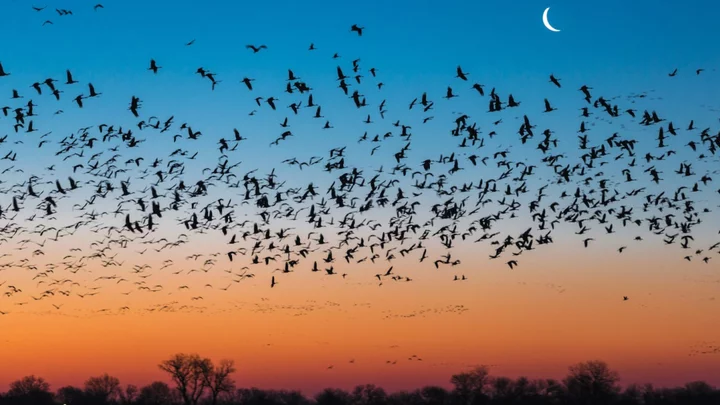Checking the weather or the air quality in your area is all well and fine. But the real cool kids are checking the nightly bird migrations.
BirdCast is a website that tells you pretty much everything you need (or just want) to know about the birds flying overhead on a given night. The first iteration of the site, which ran from 2000 to 2001, combined data from weather radar and crowdsourced bird sightings for a portrait of avian migration across the country. The current BirdCast upholds that mission—and still relies heavily on radar—but also utilizes modern machine-learning techniques and higher-tech visuals.
There are four main tools to explore:
The bird migration forecast map color-codes the continental U.S. based on predicted nocturnal migration intensity. For August 23, 2023, for example, a large patch of South Dakota will experience especially high migration, and the total bird count for the country could reach around 168 million. You can see forecasts for each of the next three nights.
The live bird migration map shows you a timelapse of the actual bird migration patterns and density from the previous night. (Or you can choose another date from the drop-down menu, which goes back to March 2018.)
On the migration alerts page, enter the name of any city in the continental U.S. to see its forecasted migration intensity for the next few nights. Even on a low-intensity night, it’s good to turn off non-essential lights between 11 p.m. and 6 a.m. so migrating birds don’t get distracted and confused. Needless to say, doing so on a high-intensity night is extra important. You can sign up for emails alerting you to extra active nights in a number of cities.
The migration dashboard may be the most fun tool. Enter a state or county for a breakdown of its recent migration action, from an estimate of how many birds flew through during the previous night to a chart showing how this year’s average avian traffic compares to older data. This is also where you can find out which species are most likely coming or going.
BirdCast is mainly a collaboration between The Cornell Lab of Ornithology, Colorado State University, and the University of Massachusetts Amherst, with funding and contributions from many other partners, including the National Science Foundation and NASA.
Related Tags
SCIENCE BIRDS WEATHER FUN ANIMALS TRAVEL KIDS CITIES TECH NASA Home / BIRDS
